
For many years of my career as an attorney, I was a frustrated author. No matter how demanding my career as a lawyer became, my desire to write novels remained. Reading fiction was often a great escape from real life, but my escape only fueled my desire to write my own stories.
I often hear people with careers echo versions of what I once said: I always wanted to write a novel, but I had to make a living. *
Tending to the creative process while handling the varied demands of a career can be challenging. At times, it can seem downright impossible. Truthfully, there are days when it is impossible. However, if you’re open to the possibility of being creative, and if you squeeze a fraction of time from most of your busy days, you can fulfill your dream of writing a novel.
I was recently asked to join other lawyers who are writers in a discussion on tending to the creative process while practicing law. When thinking ahead to the session, I put together tips for staying inspired to write full-length novels when juggling a busy career.
Although the tips are based upon habits I developed as an attorney, as I wrote I realized that the ideas aren’t limited to lawyers. They can apply to people with other careers who simply cannot relinquish the dream of writing a novel. Truly, as I learned when I recently reoriented myself to the creative process in my retirement, these creativity-inspiring tricks are applicable to anyone with a busy life.
1. Trust that your imagination will lead to a story.
Have you always wanted to write a novel? Do you find yourself dreaming of story ideas? If your answers are yes, then you have the most important ingredients: desire and imagination. You can stop reading right here, because the rest of my tips can be reduced to one word: Write.
Start now and continue writing. Writer’s write. Stop planning to write a novel in the future. Stop searching for that magic moment when life will be calm enough. Stop looking elsewhere for inspiration. The magic starts and ends with you. Write.
“Oz never gave nothing to the tin man, that he didn’t, didn’t already have.”
– Lyrics from Tin Man, by America (1974)
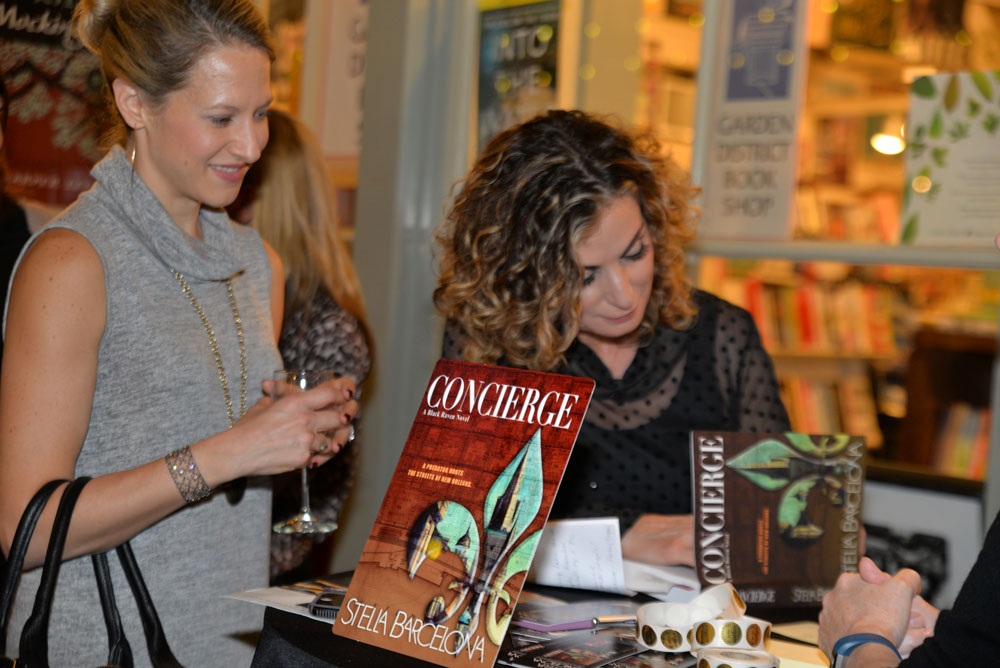
It isn’t so simple, is it? Busy lives and careers make it difficult to dedicate time to the endeavor of writing a novel. Plus, pitfalls inherent in the writing process can create self-doubt regarding the creative process. Creativity ebbs and flows with life occurrences. What works one month might not work the next.
Trusting that your imagination will ultimately produce a story, no matter how busy your life becomes, helps to smooth out the rough patches in your creative life. Find a way to develop this trust.
In The Artist’s Way, Julia Cameron encourages creative people to write first thing in the morning. Her “morning pages,” a stream-of-consciousness way of writing, are a tool for tapping into creativity. She explains that:
[A]rt is not about thinking something up. It is about the opposite—getting something down. It is as though all the stories, painting, music, performances in the world live just under the surface of our normal consciousness. Like an underground river, they flow through us as a stream of ideas that we can tap down into. As artists, we drop down the well into the stream.
–The Artist’s Way, A Spiritual Path to Higher Creativity, by Julia Cameron
No matter how you do it, tapping into the imagination is a skill that requires practice and dedication. Begin by tuning out the noise of the outside world (including work, family, and friends) for a stretch of time every day, moving past any self-doubt that may arise, and believing that you have a story to tell. Sit still. Listen to your imagination. Write.
2. Start writing now. Learn along the way.
I first became serious about writing a novel long before I started writing. Instead of writing, I researched how to write. Many well-known authors have helpful tips on how to outline a story, develop characters, and maintain story pacing. Other authors have guidance for nourishing your muse and living a creative life. I read about how to write, took creative writing classes, and attended writing conferences.
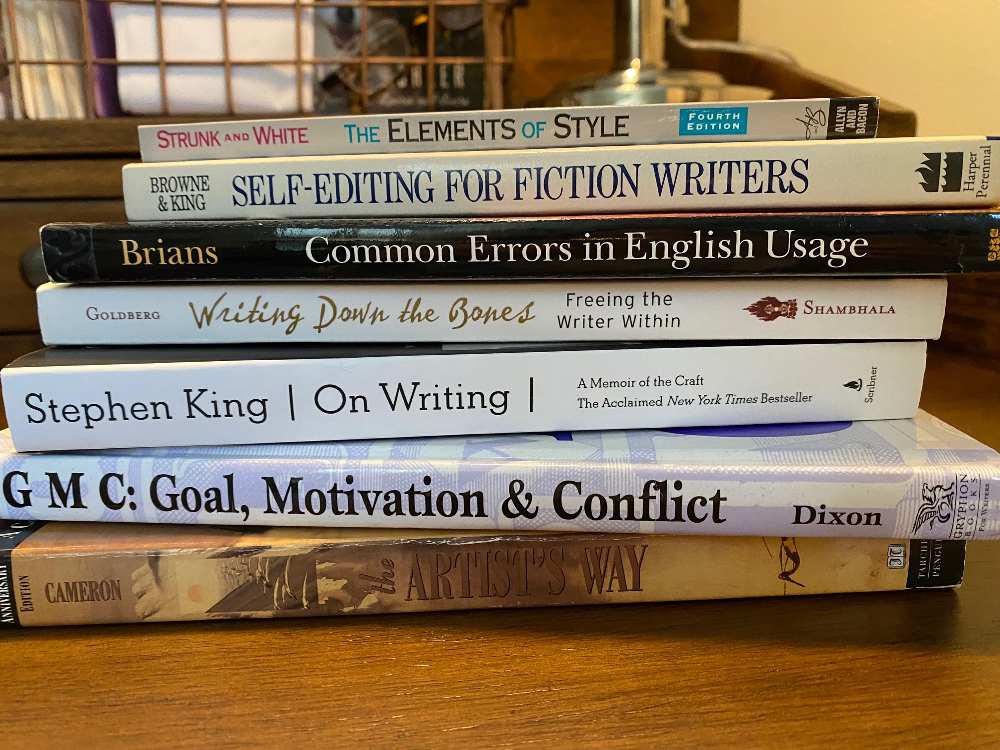
Research taught me that everyone has a different formula for success. The writing process is unique for everyone; it is important not to lose your way as you learn from others.
Also, I learned that reading about writing, or listening to other authors talk about writing, isn’t the same as writing. I could have studied what worked for others for years, but I was procrastinating. The only way I figured out what worked for me was through the trial and error that came with writing. As I write my sixth novel, I continue to learn about the craft of writing. But I am only learning as I write. I hope that I’m still learning even as I write my final novel, at a time that is far off in the future.
3. Establish time-related goals and deadlines.
Writing is like exercise. It doesn’t just happen. Decide how much time you can dedicate to the process each day. When you’re planning your week, schedule your daily writing time. Make writing an obligation, exactly like all the other things you must do in your life. If writing a novel has always been a dream of yours, you need to give the dream a fighting chance of coming true.
“Twenty years from now you will be more disappointed by the things that you didn’t do than by the ones you did do. So throw off the bowlines. Sail away from the safe harbor. Catch the trade winds in your sails. Explore. Dream. Discover.”
-Mark Twain.
Create time-related goals for the various phases of novel writing, such as idea formulation, story outline, writing a first draft, and revisions. Deadlines provide reality checks that keep you moving forward. Visualizing when you’ll write “The End,” and putting a date on it, will help that moment become reality. Of course, you’ll have to revise deadlines. I certainly have done so for nearly all of my novels and, looking back, there were times that I should have been more lenient. However, don’t give yourself too many open-ended continuances. Recognize whether an extension is necessary or simply an attempt at procrastination.
Along the way, enjoy the glow that creative writing adds to your life. Your story will become a part of you, something to think about when life becomes mundane. You’ll work through plot twists while you’re driving, develop dialogue while taking a walk, and find yourself wondering what your characters would do if they were confronted with your real-life situations. Enjoy the different perspectives on life that come with being a writer. Most of all, enjoy the warm sparks of creativity that will keep you returning to your writing time, day after day.
4. Try to write every day.
Be wary of days when you “don’t have time” to write. Those days quickly become weeks, months, and years. Have you ever enjoyed a novel but became too busy with other things to read it? Do you remember how stale the story seemed when you returned to it? The same thing will happen with the story that you’re writing if you’re away for too long.
When you only have a few minutes to dedicate to your creative effort, force yourself to open the document and sit still for your allocated writing time. Even if all you can do is tweak what you wrote the day before, or jot down an idea for what should come next, your story will benefit from the attention.
A commitment to writing every day will help your subconscious remain focused on the story. In Literary Hub Daily, a newsletter of Literary Hub, the author Ocean Vuong provided this inspiring message about the importance of keeping part of your mind focused on your story:
There are some chapters that exist in the present tense, and it’s very fast-paced. And then there are some chapters that are very slow and the tone is very different. You can’t just sit down and wing it. Those ideas have to be developed through time, and the best way is to just live your life but tend to the work mentally. Tend to it while you’re doing your dishes, while you’re showering, taking a dog for a walk.
–Ocean Vuong, Literary Hub Daily, Newsletter of April 6, 2022.
5. Write during your most creative time of day.
When is your brain least cluttered with daily life and work? Write during that time.
When I practiced law, my most creative time of day was early in the morning before work. Once I retired, I tried to write later in the day. After many, many frustrating starts and stops, I’ve made peace with the reality that early morning remains the time when I’m the most creative. As much as I dislike dragging myself out of bed at five a.m., or earlier, I do it. Save yourself the frustration that I experienced. Once you experiment to find your best time for creativity, stick with it.

6. Find a place (or places) where you can write.
The skill of tapping into your imagination requires a certain mindset. For years, my office had built-in distractions that prevented me from writing. My desk was a jumble of writing projects, personal business, and to-do lists. Piles of mail usually sat near my writing. Whenever I sat down to write, I’d invariably sift through bills. To-do lists were often sitting on top my keyboard.
Realizing that I was creating built-in distractions, I put some thought into how to make my office work as a multi-purpose space. I ultimately decided that I needed two desks, with one dedicated to creativity and the other dedicated to everything else. I realize that I’m lucky to have extra space to dedicate to writing. Not everyone has space for one desk, let alone two.
However, this tip can work just as well by simply packing away all your distractions before you begin writing. An author who spoke at a conference that I attended many years ago explained that when she wrote her early novels, with children in the house, she’d go into the garage and write in her car while her husband took care of the children. It was quiet in the garage, she didn’t have to go far, and the car was comfortable. I don’t remember the author’s name, but her comment made an impression upon me that I remember years later. Her message: don’t complicate this. Find a way.
If writing in a car isn’t appealing, what about finding a coffee shop where you can sit and focus? In Writing Down the Bones Natalie Goldberg provides wisdom on “Freeing the Writer Within.” Goldberg warns that finding just the right space can become “another trick to avoid writing.” She provides tips for writing in coffeehouses, and restaurants, and encourages writers to write “anyplace.” She explains:
“There is no perfection. If you want to write, you have to cut through and write. There is no perfect atmosphere, pen, or desk, so train yourself to be flexible.”
–Writing Down the Bones, by Natalie Goldberg
You might not need artificial boundaries between your real life and your creative life. However, if you’re easily distracted, as I was, and if you have extra space in your house, you might want to try a two-desk office as a method for tapping into your imagination. In this post on time management, I talk a bit more about how I structured my office so that my creativity started working in my favor.
Now, after years of writing, I agree with Goldberg wholeheartedly. While I haven’t mastered the art of writing anyplace, and I’m easily distracted in coffeehouses, I’m happy to report that I can now deviate from the two-desk setup. I write in a variety of locations and, thankfully, even when traveling. If I’m distracted, I’ll wear headphones and turn up music.
No matter where I’m writing, slipping into the writing mindset requires a few prompts, such as pens, pencils, calendars, headphones, and an old-fashioned composition notebook. A pot of tea helps. I streamline my prompts when traveling. I might have just a few pens and pencils, but the laptop, headphones or earbuds, and composition notebook are not negotiable. They’re always with me. These things might look like clutter, but they make me happy when I’m stumbling to my laptop in the early morning hours:


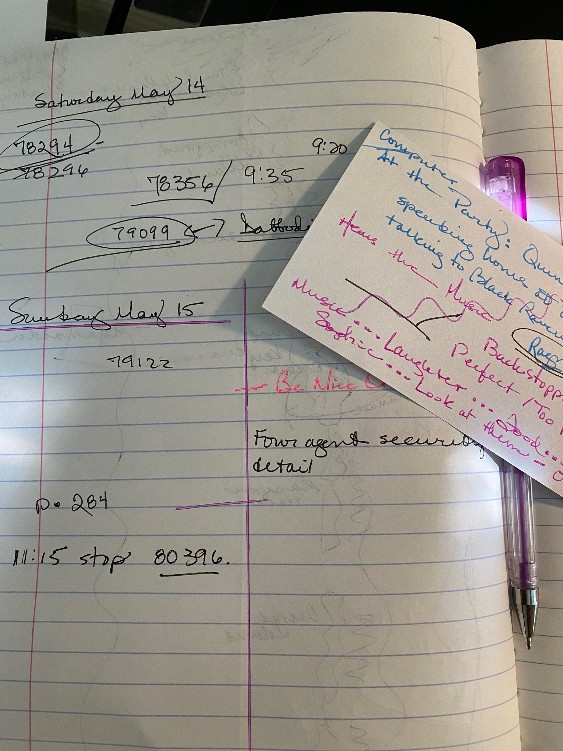
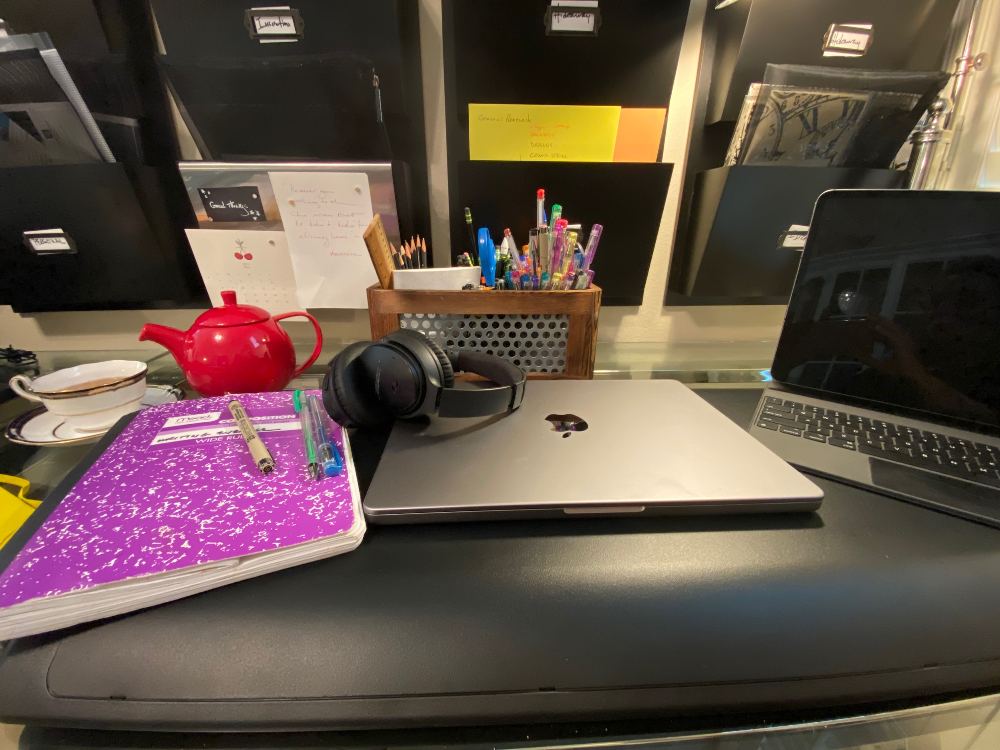
7. Find what will inspire you to keep writing.
What will provide inspiration for you? Books? Classes? Conferences? Friends who are authors? At different times, I’ve found inspiration from all these sources. Lately, inspiration arrives when I least expect it. Recently, when writing a post about visiting Gothic author Anne Rice’s grave at Metairie Cemetery, I stumbled across this lovely piece of inspirational advice on her website:
“On writing, my advice is the same to all. If you want to be a writer, write. Write and write and write. If you stop, start again. Save everything that you write. If you feel blocked, write through it until you feel your creative juices flowing again. Write. Writing is what makes a writer, nothing more and nothing less. … And remember, there are no rules for our profession. Ignore rules. Ignore what I say here if it doesn’t help you. Do it your own way. … Every writer knows fear and discouragement. Just write.”
–Ann Rice, June 15, 2009 (annerice.com).
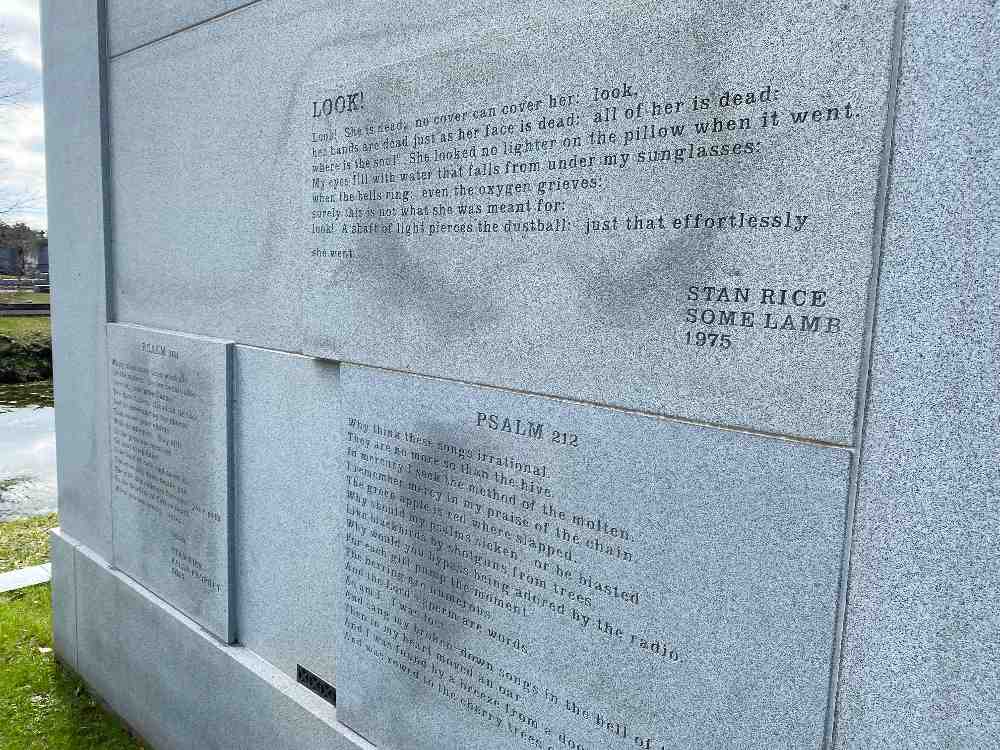
8. Fiction writing versus professional writing.
Fiction writing requires mastery of elements that are not relevant to legal writing, or any professional writing for that matter, such as characterization, point of view, dialogue, and pacing. Advice for how to master the fundamentals of the craft of writing is readily accessible in books, at conferences, and in creative writing classes. So is a world of noise.
To find helpful answers, you first need to know your questions. If you’ve written in a professional capacity, or in any other areas of your life, you may already know areas for improvement. If you’re unsure of your weaknesses, discover them by trying to write a few creative pages. After letting your work sit for a while, return to it. When you reread it, read it as you would read a passage that was written by someone else. Search for areas of weakness.
If you’re blind to problems in your creative writing, ask friends who like to read fiction to review your work with a critical eye. If you’re a lawyer, you’re in luck, since lawyers are great readers and (in my experience) they generally love to be critical. After your friends read your work, have a face to face meeting. Listen to their comments with one hundred percent of your attention. Ask questions. Watch their reactions. What they’re saying and what they’re not saying are both important.
Focus your studies on areas that present difficulties. Meanwhile, keep writing. Continually ask others to critique your work. Improve as you go along.
9. If you’re writing fiction, read plenty of fiction.
In On Writing, Stephen King emphasizes the importance of reading for authors:
“So we read to experience the mediocre and the outright rotten; such experience helps us to recognize those things when they begin to creep into our own work, and to steer clear of them. We also read in order to measure ourselves against the good and the great, to get a sense of all that can be done. And we read to experience different styles.”
— On Writing, A Memoir of the Craft, by Stephen King
When I first read this advice, I was thrilled. For several misguided reasons, I’d spent a good chunk of time thinking the opposite was true. I’ve now rediscovered the pleasures of reading. I usually read a couple of books a week and I’m currently enjoying long walks as I listen to novels. I also love to talk to other people about what they’re reading and often share what I’m reading on my Facebook page.
I’m happy to report that Stephen King is correct—reading fiction helps me analyze my own work. As a reader/author, I recognize what works in other stories regarding pacing, characterization, and setting. Particularly when editing, the flow of story elements that is apparent in well-written novels helps me determine whether my own stories are flowing as they should. Reading is a win for the reader in me, and a win for the author in me.
Good luck with your writing! Please reach out and say hello by commenting below or via email at stella@stellabarcelona.com.

Stella Barcelona
P.S. – The book links in this article go directly to Amazon. Your local bookstore or local library should be able to acquire the cited books for you. If you’d prefer to shop somewhere other than Amazon, and don’t have access to a local bookseller or library, The Garden District Bookshop in New Orleans can help.
A note on Stella’s career:
Laurie Barcelona (aka Stella Barcelona) practiced law as an Assistant United States Attorney and with Stone, Pigman, Walther, Wittmann and Hutchinson before becoming a Staff Attorney with the United States Court of Appeals for the Fifth Circuit. She received her J.D. in 1989 from Loyola Law School, where she served as a member and an editor of the Loyola Law Review. Prior to and throughout her years as a practicing attorney, Ms. Barcelona had an active imagination, a passion for reading romance, mysteries, and thrillers, and an unrelenting desire to write fiction. In 2014, during her tenure as a Staff Attorney, Ms. Barcelona published her debut novel, Deceived, a suspenseful, romantic tale that draws inspiration from the history-rich setting of New Orleans, Louisiana. Deceived introduced the continuing character of Black Raven Private Security Contractors; while working as a Staff Attorney, Ms. Barcelona wrote and published four additional novels in the Black Raven romantic suspense series. After nearly twenty years with the U.S. Fifth Circuit, Ms. Barcelona retired from practicing law. She is currently writing her sixth novel and blogs about the writing life at stellabarcelona.com.
